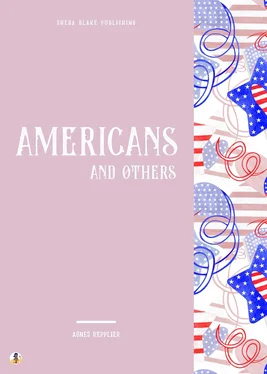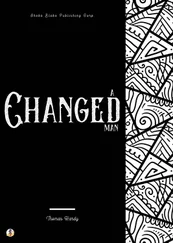Sheba Blake - Americans and Others
Здесь есть возможность читать онлайн «Sheba Blake - Americans and Others» — ознакомительный отрывок электронной книги совершенно бесплатно, а после прочтения отрывка купить полную версию. В некоторых случаях можно слушать аудио, скачать через торрент в формате fb2 и присутствует краткое содержание. Жанр: unrecognised, на английском языке. Описание произведения, (предисловие) а так же отзывы посетителей доступны на портале библиотеки ЛибКат.
- Название:Americans and Others
- Автор:
- Жанр:
- Год:неизвестен
- ISBN:нет данных
- Рейтинг книги:5 / 5. Голосов: 1
-
Избранное:Добавить в избранное
- Отзывы:
-
Ваша оценка:
- 100
- 1
- 2
- 3
- 4
- 5
Americans and Others: краткое содержание, описание и аннотация
Предлагаем к чтению аннотацию, описание, краткое содержание или предисловие (зависит от того, что написал сам автор книги «Americans and Others»). Если вы не нашли необходимую информацию о книге — напишите в комментариях, мы постараемся отыскать её.
Americans and Others — читать онлайн ознакомительный отрывок
Ниже представлен текст книги, разбитый по страницам. Система сохранения места последней прочитанной страницы, позволяет с удобством читать онлайн бесплатно книгу «Americans and Others», без необходимости каждый раз заново искать на чём Вы остановились. Поставьте закладку, и сможете в любой момент перейти на страницу, на которой закончили чтение.
Интервал:
Закладка:
Agnes Repplier
Americans and Others
First published by Sheba Blake Publishing Corp. 2021
Copyright © 2021 by Agnes Repplier
All rights reserved. No part of this publication may be reproduced, stored or transmitted in any form or by any means, electronic, mechanical, photocopying, recording, scanning, or otherwise without written permission from the publisher. It is illegal to copy this book, post it to a website, or distribute it by any other means without permission.
Agnes Repplier asserts the moral right to be identified as the author of this work.
Sheba Blake Publishing Corp.
2288 Crossrail Dr
Atlanta, GA 30349
support@shebablake.com
First edition
Cover art by Sheba Blake
Editing by Sheba Blake
This book was professionally typeset on Reedsy
Find out more at reedsy.com

One
A Question of Politeness

“La politesse de l’esprit consiste a penser des choses honnetes et delicates.”
A great deal has been said and written during the past few years on the subject of American manners, and the consensus of opinion is, on the whole, unfavourable. We have been told, more in sorrow than in anger, that we are not a polite people; and our critics have cast about them for causes which may be held responsible for such a universal and lamentable result. Mr. Thomas Nelson Page, for example, is by way of thinking that the fault lies in the sudden expansion of wealth, in the intrusion into the social world of people who fail to understand its requirements, and in the universal “spoiling” of American children. He contrasts the South of his childhood, that wonderful “South before the war,” which looms vaguely, but very grandly, through a half-century’s haze, with the New York of to-day, which, alas! has nothing to soften its outlines. A more censorious critic in the “Atlantic Monthly” has also stated explicitly that for true consideration and courtliness we must hark back to certain old gentlewomen of ante-bellum days. “None of us born since the Civil War approach them in respect to some fine, nameless quality that gives them charm and atmosphere.” It would seem, then, that the war, with its great emotions and its sustained heroism, imbued us with national life at the expense of our national manners.
I wonder if this kind of criticism does not err by comparing the many with the few, the general with the exceptional. I wonder if the deficiencies of an imperfect civilization can be accounted for along such obvious lines. The self-absorption of youth which Mrs. Comer deprecates, the self-absorption of a crowd which offends Mr. Page, are human, not American. The nature of youth and the nature of crowds have not changed essentially since the Civil War, nor since the Punic Wars. Granted that the tired and hungry citizens of New York, jostling one another in their efforts to board a homeward train, present an unlovely spectacle; but do they, as Mr. Page affirms, reveal “such sheer and primal brutality as can be found nowhere else in the world where men and women are together?” Crowds will jostle, and have always jostled, since men first clustered in communities. Read Theocritus. The hurrying Syracusans—third century B.C.—“rushed like a herd of swine,” and rent in twain Praxinoe’s muslin veil. Look at Hogarth. The whole fun of an eighteenth-century English crowd consisted in snatching off some unfortunate’s wig, or toppling him over into the gutter. The truth is we sin against civilization when we consent to flatten ourselves against our neighbours. The experience of the world has shown conclusively that a few inches more or less of breathing space make all the difference between a self-respecting citizen and a savage.
As for youth,—ah, who shall be brave enough, who has ever been brave enough, to defend the rising generation? Who has ever looked with content upon the young, save only Plato, and he lived in an age of symmetry and order which we can hardly hope to reproduce. The shortcomings of youth are so pitilessly, so glaringly apparent. Not a rag to cover them from the discerning eye. And what a veil has fallen between us and the years of our offending. There is no illusion so permanent as that which enables us to look backward with complacency; there is no mental process so deceptive as the comparing of recollections with realities. How loud and shrill the voice of the girl at our elbow. How soft the voice which from the far past breathes its gentle echo in our ears. How bouncing the vigorous young creatures who surround us, treading us under foot in the certainty of their self-assurance. How sweet and reasonable the pale shadows who smile—we think appealingly—from some dim corner of our memories. There is a passage in the diary of Louisa Gurney, a carefully reared little Quaker girl of good family and estate, which is dated 1796, and which runs thus:—
“I was in a very playing mood to-day, and thoroughly enjoyed being foolish, and tried to be as rude to everybody as I could. We went on the highroad for the purpose of being rude to the folks that passed. I do think being rude is most pleasant sometimes.”
Let us hope that the grown-up Louisa Gurney, whenever she felt disposed to cavil at the imperfections of the rising generation of 1840 or 1850, re-read these illuminating words, and softened her judgment accordingly.
New York has been called the most insolent city in the world. To make or to refute such a statement implies so wide a knowledge of contrasted civilizations that to most of us the words have no significance. It is true that certain communities have earned for themselves in the course of centuries an unenviable reputation for discourtesy. The Italians say “as rude as a Florentine”; and even the casual tourist (presuming his standard of manners to have been set by Italy) is disposed to echo the reproach. The Roman, with the civilization of the world at his back, is naturally, one might say inevitably, polite. His is that serious and simple dignity which befits his high inheritance. But the Venetian and the Sienese have also a grave courtesy of bearing, compared with which the manners of the Florentine seem needlessly abrupt. We can no more account for this than we can account for the churlishness of the Vaudois, who is always at some pains to be rude, and the gentleness of his neighbour, the Valaisan, to whom breeding is a birthright, born, it would seem, of generosity of heart, and a scorn of ignoble things.
But such generalizations, at all times perilous, become impossible in the changing currents of American life, which has as yet no quality of permanence. The delicate old tests fail to adjust themselves to our needs. Mr. Page is right theoretically when he says that the treatment of a servant or of a subordinate is an infallible criterion of manners, and when he rebukes the “arrogance” of wealthy women to “their hapless sisters of toil.” But the truth is that our hapless sisters of toil have things pretty much their own way in a country which is still broadly prosperous and democratic, and our treatment of them is tempered by a selfish consideration for our own comfort and convenience. If they are toiling as domestic servants,—a field in which the demand exceeds the supply,—they hold the key to the situation; it is sheer foolhardiness to be arrogant to a cook. Dressmakers and milliners are not humbly seeking for patronage; theirs is the assured position of people who can give the world what the world asks; and as for saleswomen, a class upon whom much sentimental sympathy is lavished year by year, their heart-whole superciliousness to the poor shopper, especially if she chance to be a housewife striving nervously to make a few dollars cover her family needs, is wantonly and detestably unkind. It is not with us as it was in the England of Lamb’s day, and the quality of breeding is shown in a well-practised restraint rather than in a sweet and somewhat lofty consideration.
Читать дальшеИнтервал:
Закладка:
Похожие книги на «Americans and Others»
Представляем Вашему вниманию похожие книги на «Americans and Others» списком для выбора. Мы отобрали схожую по названию и смыслу литературу в надежде предоставить читателям больше вариантов отыскать новые, интересные, ещё непрочитанные произведения.
Обсуждение, отзывы о книге «Americans and Others» и просто собственные мнения читателей. Оставьте ваши комментарии, напишите, что Вы думаете о произведении, его смысле или главных героях. Укажите что конкретно понравилось, а что нет, и почему Вы так считаете.












